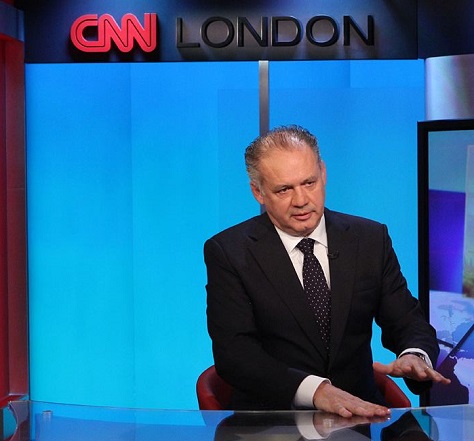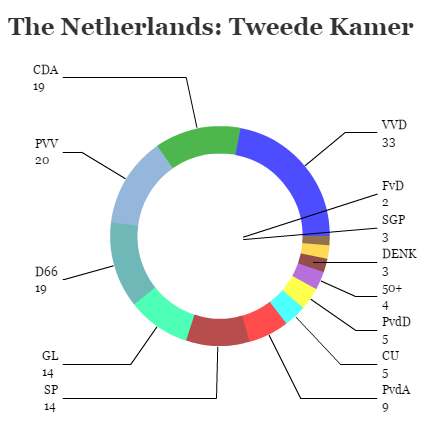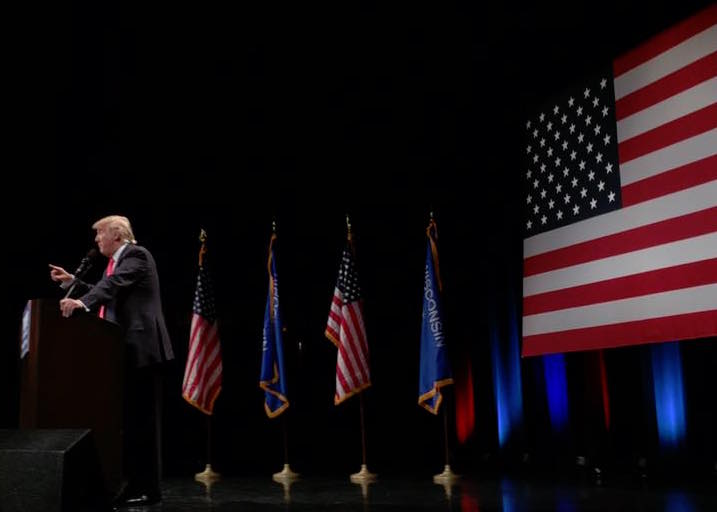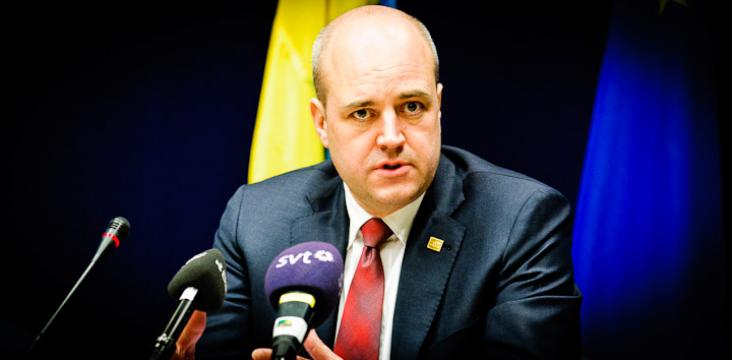
Over the weekend, Le Figaro pondered whether Donald Trump, the tart-tongued real estate mogul, might be the U.S. version of Jean-Marie Le Pen, the French far-right founder of the Front national (National Front) who’s also become notorious for controversial statements and for trampling ‘political correctness.’
Le Pen, after all, edged out the leftist prime minister Lionel Jospin in the 2002 presidential election, establishing the Fifth Republic’s most lopsided runoff between the noxious Le Pen and the incumbent, center-right Jacques Chirac. Le Pen’s daughter, Marine Le Pen, who is working to broader the FN’s appeal, is polling high in the 2017 presidential contest and may win one of the two final runoff spots.
There are significant differences between the Le Pen family and Trump. Le Pen pere frequently expressed his doubts about the Holocaust with a heavy dose of anti-Semitic populism — so far, Trump hasn’t started questioning the Holocaust or attacking Jewish Americans. But both Le Pen and his daughter developed a significant constituency of French voters by expressing outrage against the influx of immigrants into the country, a concern much closer to Trump’s heart (he announced his candidacy by attacking Mexicans, promising to build a wall along the southern US border and billing it to the Mexican government).
More recently, Marine Le Pen has broadened her attacks to include European institutions, including the eurozone, as an attack on the sovereignty of France. In her exclamations of “Oui, la France!” there’s more than an echo of Trump’s “Let’s make American great again” shtick.
But the support that Trump has amassed in the summer of 2015 isn’t so unlike the wave of populism that’s enveloped Europe (on both the right and the left). Though the US economic recovery has chiefly outpaced that of Europe’s, it’s not been an easy expansion. Sustained unemployment, tepid GDP growth and stagnant wages have left working-class and middle-class American voters less secure — just like working-class and middle-class European voters.
It’s no surprise that since 2010, several new voices of the populist right and the populist left have demonstrated their electoral muscle:
- In Italy, comic and blogger Beppe Grillo obtained nearly a quarter of the vote in the 2013 elections, and polls show that he still commands upwards of 25% of the vote. Frank Bruni wrote in May in The New York Times that Trump shares much in common with Silvio Berlusconi, the media tycoon who dominated Italian politics from the mid-1990s to the late 2000s and, like Trump, reveled in controversial pronouncements. But Berlusconi was primed for politics by Bettino Craxi, the Socialist prime minister in the 1980s who was ultimately forced into exile in Tunisia; it’s not like George W. Bush or Newt Gingrich developed Trump as a protégé.
- In the United Kingdom, anti-establishment candidates running for the Scottish National Party (SNP) wiped out longstanding Labour and Liberal Democratic strongholds in Scotland and, in the current Labour Party leadership contest, the far-left Jeremy Corbyn, a firm anti-austerian who wants to renationalize British railways, leads many surveys against more moderate opponents.
- In Greece, the far-left Alexis Tsipras and SYRIZA (Συνασπισμός Ριζοσπαστικής Αριστεράς, the Coalition of the Radical Left) took power in January’s elections, and the equally far-left Podemos hopes to pull off a similar victory in Spain’s general election in December.
It’s not surprising that economic pain, angst about sovereignty, identity and migration and other doubts about ruling political elites are fueling the same kind of anti-establishment reaction in the United States, too, and it’s the same instinct that powered the ‘tea party’ movement of the early 2010s.
It’s too soon to tell what Trump’s lasting legacy will be on the 2016 presidential race. His poll numbers might soon collapse (or not). He could wipe out before the first votes are cast in the Iowa caucuses or the New Hampshire primary. He might win a few early contests before Republican elites step in (and they will) to deny him the presidential nomination. He’s still holding the door open to an independent third-party run in the general election.
But the real template for Trump isn’t necessarily Le Pen or Tsipras or Corbyn or Grillo or even Berlusconi, though they all draw support from the same anti-establishment, populist reservoir.
Instead, it’s a duo of neophyte businessmen who have taken on powerful (and experienced) political leaders over the past two years to upend the status quo. Though Andrej Kiska and Andrej Babiš aren’t necessarily household names, even in Europe, they represent more closely the kind of appeal that Trump — at his best, perhaps — could replicate to upend the Republican establishment.
If I were Corey Lewandowski, Trump’s campaign manager, I would be furiously studying each case to extrapolate lessons for Trump.

Kiska (pictured above) is a 52-year old businessman who spent much of his life as a entrepreneur in Slovakia, making his fortune in the installment payments and the credit business. Despite his failures to break into the US market, Kiska shifted to charitable works in 2006, founding Dobrý anjel (Good Angel), a charitable organization that provides funds for the seriously ill.
Running as an independent in the Slovakian presidential election in March 2014, Kiska defeated Slovakia’s sitting center-left prime minister Robert Fico. The Slovak presidency is effectively ceremonial, but Fico’s victory would have consolidated power between the ruling party and the presidency. Fico’s defeat dealt an otherwise popular figure a significant blow — and Kiska’s victory preserved a sense of constitutional balance between the executive and the parliamentary.
Going into the election, Fico was a well-liked prime minister and Slovakia’s economic record outpaced its closest neighbors; Kiska was a political newcomer. Fico’s party, Smer–sociálna demokracia, (Smer-SD, Direction-Social Democracy), still widely leads polls for next year’s general election, for example.
Unlike Trump, Kiska didn’t campaign on the macho, alpha-male persona of a successful businessman. But Kiska succeeded by planting doubts about Fico’s campaign and the fact that Kiska was personally untainted by political corruption and ties to Soviet-era politics. By all counts, he’s thrived in the presidential role since taking office last year. The lesson to Trump is that he can dial down the antics and still present a capable challenge to the GOP establishment. Though Trump may embellish the influence that his past donations might have procured, there’s no doubt he is right when he showcases the corrosive influence of money on politics in the post-Citizens United world.

Babiš (pictured above) is also a Slovak-born businessman, but the 60-year old made his fortune in the Czech Republic. Like Kiska, he left business to form a political party, Akce nespokojených občanů (ANO, Action of Dissatisfied Citizens) in 2011.
In the 2013 Czech elections, ANO won nearly 20% of the vote, finishing a strong second to the Česká strana sociálně demokratická (ČSSD, Czech Social Democratic Party) in a highly fragmented result. Babiš, who developed Agrofert, an agricultural and food processing company, into one of the most successful companies in the country, later purchased a series of media companies before he turned to politics as one of the wealthiest men in the Czech Republic. Not surprisingly, Babiš argued that he would govern the Czech Republic like a business.
More caustic than Kiska, and more sympathetic to neoliberal policies, Babiš attacked both Czech social democrats and conservatives as corrupt and dishonest, arguing for an end to immunity for political figures. In 2012 and 2013, despite his inexperience, he expertly filled a void for an electorate that had lost trust in the central European country’s ruling elite. In that regard, Trump’s rhetoric much more strongly resembles that of the pugilistic Babiš.
In the past four years alone, a center-right prime minister resigned after his chief of staff (with whom he had become romantically involved) was caught spying on the former prime minister’s wife. It’s also a country where a former Social Democratic prime minister won the presidency in early 2013 and immediately tried to outmuscle the Czech parliament in a constitutional power struggle. That gave Babiš the opportunity to present himself as the truth-telling man of action, despite fears that ‘Babišconi’ would become just another oligarchic leader and despite troubling accusations that he cooperated with the Czech internal police during the Soviet era as well as with the Soviet KGB.
Nevertheless, after the 2013 election, Babiš set aside his differences with elites and brought ANO into the current government — he now serves as the country’s finance minister. Though the next Czech elections do not have to be held until 2017, ANO leads polls and there’s a good chance that Babiš could become the next prime minister.
The lesson here from Trump is that the righteous ‘pox-on-both-your houses’ anger of the outsider can be effective so long as it’s targeted on the tangible excesses and failures of the ruling class. But it’s not enough, as Trump has done, just to call yourself ‘smart’ and politicians ‘stupid.’ What made Babiš successful was presenting the devastating case for why Czech politics had become so broken.

![]()








